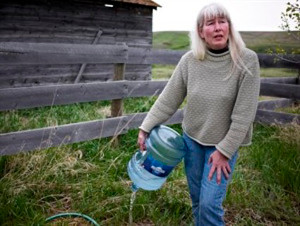
In a blindingly white and ultra-modern courtroom on the 26th floor of the TransCanada Pipeline Tower in downtown Calgary, three Court of Appeal justices heard arguments yesterday on whether government regulators or officials are protected from violating the nation's Charter of Rights due to immunity clauses.
The hearing concerned Jessica Ernst's landmark $33-million lawsuit against the Alberta government, Encana, and the Energy Resources Conservation Board (ERCB) -- Alberta's energy regulator now known as the AER -- for negligence and breach of Charter of Rights.
The lawsuit alleges that industry activity including the hydraulic fracturing of shallow coal seams between 2001 and 2004 in central Alberta contaminated local aquifers with methane, making Ernst's water flammable.
In particular, the lawsuit alleges that the ERCB violated Ernst's right to free expression under the Charter by banishing her from contact with the board while she was dealing with the pollution issues on her property.
Last year, Chief Justice Neil Wittmann ruled that the case against Encana and Alberta Environment could proceed to trial, but he dismissed the claim against the energy regulator on the grounds that a statutory immunity clause excepted it from civil action and Charter claims.
Ernst's lawyer Murray Klippenstein argued yesterday that no government or province can legislate themselves out of the fundamental rights guaranteed by the Charter of Rights, on which Ernst's claim is based. He called the Charter "the supreme law of the land."
He argued that Ernst's right to freedom of expression was breached in 2005 when the regulator sent her a letter accusing her of making "criminal threats." It informed her that regulator staff had been told "to avoid any further contact" with Ernst.
A letter by Ernst seeking clarification on that decision and what basis it was made was refused by the board and returned unopened.
For a six-month period, the board, which had a mandate to protect the public interest, refused to address the issue of water contamination or answer Ernst's calls, according to Ernst's original statement of claim.
In a taped conversation in June 2006 with ERCB lawyer Rick McKee, McKee said that "criminal threats" were never an issue, but that the board was upset with the landowner for airing her grievances in public and therefore embarrassing the regulator.*
"What you are doing is, hey, I don't want to make it sound like people are a bunch of sensitive, you know, but at the end of the day, you are, you seem to be, attempting to humiliate the organization. And if that is your intention good on you, but don't expect us to help you," McKee told Ernst.
(The Tyee has heard the recording, read the transcripts and checked with actual witnesses. The incident is detailed in the original statement of claim.)
'The damages existed when she came to us': regulator
Without alluding to this incident, Glen Solomon, the lawyer representing the ERCB, argued that board's immunity clause exempted it from Charter claims, and that the board didn't cause any damages or harm.
"The damages existed when she came to us," he said. In other words, the lawsuit should only address the regulated for damages, and not the regulator.
During the hearing, Justice Jack Watson said that the issues at stake were "not trivial," and that he was not unsympathetic to a matter as serious as groundwater contamination. More than 20 citizens and landowners filled the benches to witness the proceedings.
"Jessica is fighting for the welfare of the public in general," said Shawn Campbell, a semi-retired 65-year-old rancher from Ponoka, Alberta. "To me, the issue is government transparency, and we have none of it. They're in the deepest closet they can find."
Don Bester, a rancher and president of the Alberta Surface Rights Group, said the court's decision will have ramifications throughout the province.
"If the ERCB doesn't have any liability or accountability for projects they have approved, then they will have no right to make any approvals on my land."
Justice Jean Edouard Leon Cote said the court will issue a written judgement soon.
A different ruling on whether or not Alberta Environment is also exempt from civil action will not be issued until after the Court of Appeal makes its decision.
*Story corrected May 10 at 9 p.m. Paragraph incorrectly identified a year. ![]()
Read more: Energy, Environment















Tyee Commenting Guidelines
Comments that violate guidelines risk being deleted, and violations may result in a temporary or permanent user ban. Maintain the spirit of good conversation to stay in the discussion.
*Please note The Tyee is not a forum for spreading misinformation about COVID-19, denying its existence or minimizing its risk to public health.
Do:
Do not: